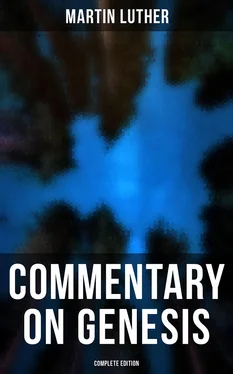Martin Luther - Commentary on Genesis (Complete Edition)
Здесь есть возможность читать онлайн «Martin Luther - Commentary on Genesis (Complete Edition)» — ознакомительный отрывок электронной книги совершенно бесплатно, а после прочтения отрывка купить полную версию. В некоторых случаях можно слушать аудио, скачать через торрент в формате fb2 и присутствует краткое содержание. Жанр: unrecognised, на английском языке. Описание произведения, (предисловие) а так же отзывы посетителей доступны на портале библиотеки ЛибКат.
- Название:Commentary on Genesis (Complete Edition)
- Автор:
- Жанр:
- Год:неизвестен
- ISBN:нет данных
- Рейтинг книги:4 / 5. Голосов: 1
-
Избранное:Добавить в избранное
- Отзывы:
-
Ваша оценка:
- 80
- 1
- 2
- 3
- 4
- 5
Commentary on Genesis (Complete Edition): краткое содержание, описание и аннотация
Предлагаем к чтению аннотацию, описание, краткое содержание или предисловие (зависит от того, что написал сам автор книги «Commentary on Genesis (Complete Edition)»). Если вы не нашли необходимую информацию о книге — напишите в комментариях, мы постараемся отыскать её.
Commentary on Genesis is the last work of Martin Luther, written during the last several years of his life. Luther's work follows the first volume of Psalms with critical and devotional remarks on the creation and on sin and the flood.
Commentary on Genesis (Complete Edition) — читать онлайн ознакомительный отрывок
Ниже представлен текст книги, разбитый по страницам. Система сохранения места последней прочитанной страницы, позволяет с удобством читать онлайн бесплатно книгу «Commentary on Genesis (Complete Edition)», без необходимости каждый раз заново искать на чём Вы остановились. Поставьте закладку, и сможете в любой момент перейти на страницу, на которой закончили чтение.
Интервал:
Закладка:
With respect therefore to this opinion of Augustine, we conclude that Moses spoke literally and plainly and neither allegorically nor figuratively; that is, he means that the world with all creatures was created in six days as he himself expresses it. If we cannot attain unto a comprehension of the reason why it was so, let us still remain scholars and leave all the preceptorship to the Holy Spirit!
These days were distinguished thus. On the first day the unformed mass of heaven and earth was created to which light was then added. On the second day the firmament. On the third day the earth was produced out of the waters and its fruits created. On the fourth day the heavens were adorned by the creation of the sun, moon and stars. On the fifth day the fishes of the sea and the fowls of the air. On the sixth day the beasts of the earth were created, and Man was made. I say nothing of the other views which divide these sacred matters into the work of creation, of distinction, and of ornation, because I do not think such divisions of the subject can be made to harmonize in all respects with each other. If any one admire such views let him consult Lyra.
As to Lyra thinking that a knowledge of the opinion of philosophers concerning matter is necessary, and that on such knowledge must depend a man's understanding the six days' work of creation, I question whether Lyra himself really understood what Aristotle calls matter. For Aristotle does not, like Ovid, call the original unformed chaotic mass matter. Wherefore omitting these unnecessary subjects altogether, let us come at once to Moses as a far better teacher, whom we may more safely follow than we may philosophers, who dispute without the Word about things they do not understand.
II. God's Work on the Six Days in Particular
Table of Contents
Part I. God's Work on the First Day
Table of Contents
I. V. 1. In the beginning God created the heavens and the earth.
A necessary and a very difficult question arises here, in that Moses speaks of the creation of the heavens and the earth, and yet does not mention the day on which nor the Word by which they were created. For one naturally inquires why Moses did not rather use the same form of words here, as he did subsequently, where mention is made of the Word thus: "In the beginning, God said, Let there be the heavens and the earth?" For Moses mentions "the heavens and the earth" before God had spoken anything, whereas both the Decalogue and the whole Scripture testify that God made the heavens and the earth, and all that in them is, "in six days." But as I said before, we enter on this path without a guide. We leave therefore to others to follow their own judgment here, while we will expound it according to our views.
Not those elements which now are, but the original rude and unformed substances Moses calls "the heavens and earth." The water was dark, and because it was by nature the lighter element it surrounded the earth, itself also as yet unformed was a kind of mud. God formed this first material, if I may so call it, of his future work, not before or apart from the six days, but, according to the express words of the Decalogue, in the "beginning" of the first day.
As I view the matter therefore Moses does not mention here the first day, because these confused substances of the hitherto rude heavens and earth were afterwards formed, and as it were fully adorned and distinguished. For what he immediately calls the "deep" and the "waters;" that is, the rude and unformed water which was not yet distributed nor adorned with its proper form, he here calls "the heavens;" whereas, had Moses spoken otherwise and had said, "In the beginning God said, Let there be the heavens and the earth;" there would have been no need of afterwards saying, "God said;" seeing that these unformed waters would have been already illuminated and the light would have been already created.
The meaning of Moses therefore in all simplicity is that all things which now exist were created by God and that "in the beginning" of the first day were created the mass of mud or of earth, and of dark mist or of water; on which afterwards, in the after part of the first day, God shed the light and caused the day to appear, which might discover this rude mass of "the heavens and the earth;" which was in all respects like undeveloped seed, and yet adapted to produce whatever God should require.
V. 2a. And the earth was waste and void.
In the Hebrew words TOHU and BOHU there is no more meaning than can be expressed in any other language, yet these terms are frequently used in the sacred Scriptures. TOHU means "nothing," so that a TOHU earth means, in its simple reality, that which is in itself "empty" or "waste;" where there is no way, no distinction of places, no hill, no vale, no grass, no herbs, no animals, no men. And such was the first appearance of the waste and untilled earth, for while the water was mixed with the earth no distinctions of those various objects could be discerned, which are clearly seen since the earth's formation and cultivation.
Thus Isaiah, 34:11, when threatening destruction to the whole earth says "There shall be stretched upon it the line of TOHU, confusion; and the plummet of BOHU, emptiness;" that is, it shall be made so desolate that neither men nor beasts shall be left upon it; all houses shall he devastated and all things hurled into chaos and confusion. Just as Jerusalem was afterwards laid waste by the Romans and Rome by the Goths, so that no vestige of the ancient city as it once was could be pointed out. You now behold the earth standing out of the waters, the heavens adorned with stars, the fields with trees, and cities with houses; but should all these things be taken away and hurled into confusion and into one chaotic heap, the state of things thus produced would be what Moses calls TOHU and BOHU.
As the earth was surrounded with darkness or with waters over which darkness brooded, so also the heaven was unformed. It was not only TOHU because it was destitute of the garnishing of the stars, and BOHU because it was not yet separated and distinguished from the earth, but because it was as yet altogether destitute of light and a dark and deep abyss which like a dense cloud enveloped the earth, or that mass of mud; for the division of the waters from the waters follows later.
Here then we have the first thing which Moses teaches: that the heavens and the earth were created on the first day; but, that the heaven was as yet unformed, not separated from the waters, destitute of its luminaries, and not elevated to its position; and the earth in like manner was as yet without its animals, its rivers and its mountains.
As to Lyra's argument that this original matter was mere power and was afterward rendered substance by its own power, or as to what Augustine says in his book of "Confessions," that matter is as it were nothing, and that no medium matter can be thought of between the Creator and the thing created; such subtle disquisitions I by no means approve. For how could that be a mere nothing which was already of such material and substance that Moses calls it "the heavens and the earth"? Unless indeed you would call it artificially the same kind of matter which you call wood, which is not yet wrought into a chest or a bench. But this latter substance is what true philosophers would call matter in a secondary state.
We should rather consider the whole subject, as Peter considers it, 2 Pet. 3:5, where speaking of the wicked, he says "For this they wilfully forget, that there were heavens from of old, and an earth compacted out of water and amidst water, by the word of God; by which means the world that then was, being overflowed with water, perished." For Peter seems to intimate that the earth consists of water, and was made out of water, and that after it was produced out of water and placed as it were in the light, it swam as it now seems to do in the water. This, says he, the wicked knew, and therefore being confident of this condition of things, they feared no peril from water, which they knew to be the fundamental substance of the earth. Yet the water destroyed that earth which it preserved, buoyed up and bore; just as at the last it shall be destroyed by fire. From this intimation of Peter, it would appear, that the earth was made to stand in the water, and out of the water. But let this suffice concerning the original matter or material. If any one should discuss the subject with greater subtlety of argument, I do not think he would do so, with any profit.
Читать дальшеИнтервал:
Закладка:
Похожие книги на «Commentary on Genesis (Complete Edition)»
Представляем Вашему вниманию похожие книги на «Commentary on Genesis (Complete Edition)» списком для выбора. Мы отобрали схожую по названию и смыслу литературу в надежде предоставить читателям больше вариантов отыскать новые, интересные, ещё непрочитанные произведения.
Обсуждение, отзывы о книге «Commentary on Genesis (Complete Edition)» и просто собственные мнения читателей. Оставьте ваши комментарии, напишите, что Вы думаете о произведении, его смысле или главных героях. Укажите что конкретно понравилось, а что нет, и почему Вы так считаете.












